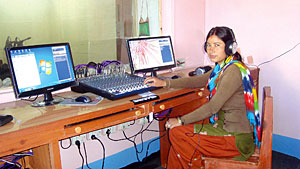 |
JUMLA - I was 16 and waiting for my SLC results when I made my first radio program for the Karnali's first radio station here in Jumla. It was a program for children, to provide them with knowledge they would not get from textbooks in an entertaining way. It was challenging and exciting for me, but it also brought plenty of criticism in our patriarchal society. I had gone against the traditional norms of society, and what was expected of young women. I had to go out into the countryside to collect information for my program, often in the company of men. The work at the radio meant staying late at the station, meeting new people every day. All this gave plenty of grist for the gossipers in town. Fortunately I had a mother was fully supportive and cushioned me from the criticism.
My colleague Krishnamaya Hamal's mother wasn't as supportive, and came under so much pressure at home that she had to abandon her dream of working as journalist. There are many young women like her here in the Karnali who have had to give up their aspirations to serve in the media.
So imagine my pride and sense of achievement when we established the Karnali's first all-women FM station, Nari Awaz last month. Back then, I had never imagined that seven years later we would have our own station to broadcast programs on gender issues and women's empowerment. We overcame the obstacles, the rumour mongers and naysayers, the technical and financial difficulties and we challenged societal norms to set up Nari Awaz.
In this we were assisted by women working in different fields in Jumla who had the conviction that a radio station would strengthen their voice and make a difference in a society that is lagging behind the rest of the country precisely because more of its women are not involved in decision-making. It has been an uphill struggle, but the day the transmitter tower went up and stood out against the deep blue monsoon sky was the proudest moment of my life. It is now a question of providing meaningful and relevant content to the listeners of Nari Awaz, who I might add are not just women. Nari Awaz may be an all-women radio station but its most important role is to educate and inform menfolk of the Karnali as well.
Today, I believe the Karnali Zone has a reason to smile. Women in the Karnali now have a sizable presence in the media sector, and Nari Awaz will set an example for other women to also take up journalism to spread awareness about the role women can play in uplifting the Karnali community.
Haridevi Rokaya is the Jumla correspondent of the BBC Nepali Service.
Read also:
The new radio revolution, RUBEENA MAHATO
Sajha Sawal is 200
BBC Nepali's popular radio discussion program hits a second century


